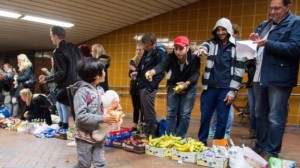Austria and Germany are expecting thousands more migrants to arrive from Hungary after Budapest eased restrictions on their travel.
Throughout Saturday, by bus, train and on foot, people travelled to the Austrian border before moving on to Vienna and Munich.
Austrian officials are laying on more trains as needed.
German Chancellor Angela Merkel is to hold talks with her coalition partners on a crisis that has divided the EU.
After days of confrontation and chaos, Hungary opened its borders with Austria and bussed thousands of migrants to the frontier.
Up to 10,000 arrived at the border, according to the Austrian authorities, who have said they do not plan to limit the numbers crossing into the country.
Many travelled straight on to Munich, southern Germany, where locals greeted them with applause, giving sweets to the children among the new arrivals.
They have been sent on to reception centres to be registered and receive food and clothing.
A memorial has been held in Vancouver, Canada for three-year-old Alan Kurdi, his brother Ghalib and mother Rehanna, who drowned trying to reach Kos. The three have family there.
Pictures of Alan’s body, washed up on a Turkish beach, sparked international outrage.
Members of the Kurdi family who live in Vancouver were joined by more than 100 people to remember the three Syrians, who died on the journey to Europe after fleeing the conflict in their home country. Canada had earlier rejected an asylum application on behalf of the family.
Tima Kurdi, the boys’ aunt, said she was worried about their father Abdullah, who attended the burial for his family in Syria on Friday.
“He’s not leaving the graves. He was sleeping the last three days there, on the ground, beside them.”
Both Germany and Hungary have said the current measures are aimed at averting a humanitarian crisis, and will not set a precedent.
The rules requiring refugees to apply for asylum in the first country they land in “are still valid, and we expect other European Union member states to stick to them”, a German government spokesman said.
Chancellor Merkel has said Germany can cope with the influx of newcomers without raising taxes or jeopardising its budget.
Germany is the key destination for arrivals on European shores, and expects to take in 800,000 people this year.
Syrians fleeing a brutal civil conflict are the largest group travelling, followed by Afghans and Eritreans.
There is little sign of a co-ordinated EU response to the crisis, despite more than 350,000 migrants having crossed the EU’s borders in 2015 alone.
Europe’s migrant crisis is “here to stay” and nations must act together to deal with it effectively, the EU’s foreign policy chief said after “difficult” talks with foreign ministers in Luxembourg.
“In three months time, it will be other member states under the focus, and in six months, it could be others again,” Federica Mogherini said.
Germany, backed by the European Commission, has been pushing for a quota system for dividing the people reaching Europe between member states.
But this has been opposed by several eastern members.
On Saturday, Hungary said that while it had temporarily relaxed restrictions on the transit of asylum seekers, it was pressing ahead with plans to tighten border controls and could send troops to its southern frontier if parliament agreed.
BBC
 Q FM Africa's Modern Radio
Q FM Africa's Modern Radio
